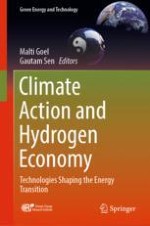2024 | OriginalPaper | Buchkapitel
Sustainable Pathways for Hydrogen Production via Molecular Catalysts
verfasst von : Mahendra Kumar Awasthi, Surabhi Rai, Arnab Dutta
Erschienen in: Climate Action and Hydrogen Economy
Verlag: Springer Nature Singapore
Aktivieren Sie unsere intelligente Suche, um passende Fachinhalte oder Patente zu finden.
Wählen Sie Textabschnitte aus um mit Künstlicher Intelligenz passenden Patente zu finden. powered by
Markieren Sie Textabschnitte, um KI-gestützt weitere passende Inhalte zu finden. powered by
Abstract
-
Current approach for production of hydrogen
-
Role of bio-inspired molecular catalysis in hydrogen production
-
Pathways for sustainable hydrogen production from water
